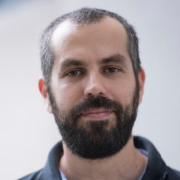אני פרופסור חבר בבית הספר ללימודי חברה ומדיניות, עם שיוך לבית הספר למדעי הפסיכולוגיה, וראש התוכנית לניהול סכסוכים וגישור באוניברסיטת תל אביב. סיימתי את לימודי הדוקטורט בפסיכולוגיה חברתית באוניברסיטת תל אביב ב-2019. בין 2018 ל-2020 עשיתי פוסטדוקטורט ב-Peace and Conflict Neuroscience Lab באוניברסיטת פנסילבניה, וכן במעבדת החדשנות של Beyond Conflict.
פרופ' בועז המאירי
ראש תכנית במדיניות ציבורית

מידע כללי
תחומי מחקר
המחקר שלי כולל בחינה של חסמים פסיכולוגיים שונים לשינוי עמדות ויישוב סכסוכים (לדוגמה, קורבנות), וכן פיתוח של התערבויות פסיכולוגיות (לדוגמה, חשיבה פרדוקסלית) בשביל להתמודד עם החסמים הללו ולקדם שיפור ביחסים בין קבוצות ויישוב סכסוכים. במחקרי אני משתמש בעירוב של מתודולוגיות, כמותיות ואיכותניות (לדוגמה, תחרות התערבויות), במעבדה ובשדה בקנה מידה גדול, בקונטקסטים שונים ואוכלוסיות שונות בכל רחבי העולם, בשיתוף פעולה עם חוקרים בינלאומיים, וכן ארגונים לשינוי חברתי, אנשי פרסום ומומחים למדיה.
פרסומים נבחרים
:לרשימה מלאה ומתעדכנת של רשימת הפרסומים שלי, ראו





